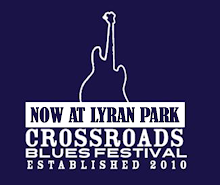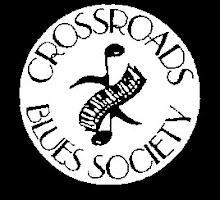The Vagabond King
A Kindle ebook by James Conway
www.amazoncom
Crossroads Blues Society, from time to time, gets sent books about the blues or fiction with a strong blues theme. The Vagabond King came to us as a "blues" themed novel. There is a slight element of blues music here, but in actuality it is a coming-of-age story as old as the Prodigal Son story, upon which this novel relies. More than anything, The Vagabond King is a study in comparative religions and a search for the meaning of life. Blues fans won't find much here to latch on to.
The Vagabond King is a story of sixteen year old Christopher Columbanus (yeah, I know) who leaves home after his mother's death from cancer to escape his overbearing father and find his way. It’s an old story and there isn’t enough action or dialog here to make this a page turner. Conway knows his world’s religions and each nation’s quest for freedom. Yet his Holden Caufield-esque character fails to find the answers and realize his true worth. Like his namesake, he begins his journey in search of a new world that has meaning to him and encounters Magda, a waitress, and her aging father, an escapee from Hungary after the Russian invasion. Christopher’s seeking shelter for one night turns into months of living with Magda and her father. Llazlo (the father) teaches Christopher to drink beer and hear the suffering emanating from his scratchy collection of rummage sale blues records. Only a slight reference to one of Muddy Water’s bands give any indication of what is in the box. Like the narrator’s name, Conway’s metaphors sit heavy on the reader, and does the numbing repetition of certain lines and themes. We don't know much about Christopher’s family, initially, except that his mother was an avid reader of religious tomes, as is Magda. We also encounters a black man, Atman O'Dey who befriends Christopher at the printing plant where drug to find work to "earn his keep" by llazlo, "The Old Man." O’Dey is also somewhat of a prophet with a Socialist bent. There are, indeed, shades of Catcher in the Rye, Siddhartha, A Confederacy of Dunces, and biblical stories throughout the novel. Yet there seems to be no denouement. Christopher is finally seduced by Magda, who has been the object of his young desire for months, yet their relationship seems unchanged and she disappears from the narrative. The Old Man who becomes a replacement father to Christopher die eventually leaving him the medal (talisman)he has worn around his neck for ages. However at the end of the book Christopher is seems to have learned little, nor is he saved. Antman commits suicide as “the world” bears down on him day by day. At the end of the novel, Christopher, who finds out he is adopted at a young age, learns, as well, upon the return home to his father, that the father, was adopted. What has plodded for 300+ pages ends in a flurry of cleanup as we learn from an old Christopher, that Magda has died, left him a son, and that his father named Joe is really also a Christopher. Whatever internal conflict Christopher has been fighting seems not to have been addressed. Much is made of names, searching, travel, and deliverance in this novel, yet Christopher dies of caner, like his mother, we don’t know whether he has learned anything from all the “teachers” he has encountered. We don’t know what, where, or how his adult years have played out. For all of the pondering of mankind seeking salvation, the similarity of all religions, the cycle of time, we are left without answers. Even the blues seemed valueless at the end.
Conway repeats lines from an untitled blues song “can’t you hear me callin” in parts of the novel, as well as the refrain “seek yourself a deeper question.” Here and there pages are interrupted with lines designed to be poetry that sometimes rant and sometimes preach but rarely reach poetic. There are moments, however that make The Vagabond King readable: Christopher being discovered by the Old Man holding Magda’s under garments to his face, and paragraphs like the following:
"In shotgun shacks and general stores throughout the south, shirtless boys in coveralls, the sons of sharecroppers and the grandsons of slaves, learned their licks on old harmonicas and single string guitars. Lazy, no good, useless musicians, they hid from the cotton fields in graveyards and back water bayous well into manhood just to get, I said, just to get some time to play. Then, one day, wanderlust took hold of them and they abandoned wives and meaningless lives behind a mule and plow to travel, like the troubadour poets in the days of old. Moving up and down the riverside, they played in the juke joints of road gangs and lumber camps where plow boys and prostitutes gathered at the crossroads of their working days to get drunk and curse their maker. From town to town, they adapted and augmented the musical ideas of others until they raised a simple down home musical form to the level of soul stirring art. Their lyrics and guitar licks chased each other like stray dogs from the plantations to the prison yards. Through back street brothels and levee camps, in the big cities of St. Louis and Chicago the music left its mark upon the scratched, the scratched, the scratched and spinning grooves of time, and flowed through my psyche like the mighty Mississippi itself. "
As this was sent as a PDF file, I have no idea whether Conway has published other books or what the intent of this novel was. If it was instruction or enlightenment, for me it failed. The subtitle on the accompanying artwork reads: “in a world such as this what more can a man ask for?” Well, for this man, more details, fewer heavy-handed metaphors, more answers and more BLUES.
Reviewed by David Stine
(Editors note...James Conway has published several e-books for Amazon, including this one.)
























